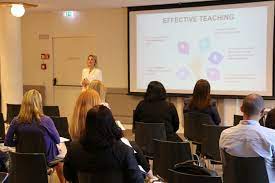The Importance of Conferences in Today’s Business World
Conferences play a crucial role in today’s fast-paced business world. They provide a platform for professionals to network, share knowledge, and stay updated on industry trends. Here are some reasons why conferences are essential:
- Networking Opportunities: Conferences offer a unique opportunity to connect with like-minded individuals, potential clients, and industry experts. Building relationships at conferences can lead to new business opportunities and collaborations.
- Knowledge Sharing: Attending conferences allows professionals to learn from keynote speakers, attend workshops, and participate in panel discussions. This knowledge-sharing helps individuals stay informed about the latest developments in their field.
- Professional Development: Conferences often include sessions focused on skill development, leadership training, and career advancement. These opportunities help professionals enhance their expertise and grow in their careers.
- Market Insights: Industry-specific conferences provide valuable insights into market trends, consumer behavior, and competitive strategies. Staying informed about market dynamics is essential for making informed business decisions.
- Promoting Innovation: Conferences serve as a platform for showcasing innovative products, services, and ideas. By sharing innovative solutions with a diverse audience, businesses can attract investors, partners, and customers.
In conclusion, conferences are an integral part of the modern business landscape. They offer numerous benefits ranging from networking opportunities to professional development and market insights. By actively participating in conferences, professionals can stay ahead of the curve and drive success in their respective industries.
7 Essential Tips for Maximizing Your Conference Experience: From Planning to Networking and Beyond
- Plan and organize your schedule in advance to make the most of the conference.
- Network with other attendees to build connections and opportunities for collaboration.
- Attend a variety of sessions to gain diverse insights and knowledge.
- Be an active participant by asking questions and engaging in discussions.
- Take breaks to recharge and avoid burnout during long conference days.
- Follow up with new contacts after the conference to maintain relationships.
- Share your learnings and experiences from the conference with colleagues or on social media.
Plan and organize your schedule in advance to make the most of the conference.
To maximize the benefits of attending a conference, it is essential to plan and organize your schedule in advance. By carefully selecting sessions, workshops, and networking opportunities that align with your goals and interests, you can make the most of your conference experience. Creating a detailed itinerary will help you stay focused, manage your time effectively, and ensure that you don’t miss out on valuable learning and networking opportunities. Planning ahead allows you to optimize your conference experience and make meaningful connections that can enhance your professional growth.
Network with other attendees to build connections and opportunities for collaboration.
Networking with other attendees at conferences is a valuable strategy to build meaningful connections and create opportunities for collaboration. By engaging with like-minded professionals, sharing experiences, and exchanging ideas, you can establish relationships that may lead to new business ventures, partnerships, or innovative projects. Building a strong network at conferences not only expands your circle of influence but also opens doors to potential career growth and professional development.
Attend a variety of sessions to gain diverse insights and knowledge.
Attending a variety of sessions at conferences is key to gaining diverse insights and knowledge. By participating in different workshops, panel discussions, and keynote speeches, attendees can broaden their understanding of various topics and perspectives within their industry. This exposure to diverse viewpoints not only enriches one’s knowledge base but also fosters creativity and innovative thinking. Embracing a range of sessions allows individuals to connect the dots between different ideas and approaches, ultimately enhancing their overall conference experience and professional growth.
Be an active participant by asking questions and engaging in discussions.
To maximize your conference experience, it is essential to be an active participant by asking questions and engaging in discussions. By actively participating in sessions and workshops, you not only demonstrate your interest and enthusiasm but also gain valuable insights from speakers and fellow attendees. Asking thoughtful questions can spark meaningful conversations, foster new connections, and deepen your understanding of the subject matter. Remember, conferences are not just about listening but also about actively engaging with others to enhance your learning and networking opportunities.
Take breaks to recharge and avoid burnout during long conference days.
During long conference days, it is crucial to prioritize taking breaks to recharge and avoid burnout. Stepping away from the hustle and bustle of sessions and networking activities allows attendees to rest, refocus, and maintain their energy levels. By incorporating short breaks into their schedules, conference participants can enhance their overall experience, stay engaged, and ensure they make the most out of the event without feeling overwhelmed or fatigued. Remember, self-care is essential for productivity and well-being during intensive conference days.
Follow up with new contacts after the conference to maintain relationships.
Following up with new contacts after a conference is crucial for maintaining relationships and maximizing the networking opportunities gained during the event. Sending a personalized email or making a follow-up call shows your interest in continuing the conversation and solidifying the connection made at the conference. By staying in touch with your contacts, you not only strengthen professional relationships but also open doors for potential collaborations, partnerships, or future opportunities. Consistent follow-up is key to turning initial introductions into long-lasting and mutually beneficial relationships in the business world.
Share your learnings and experiences from the conference with colleagues or on social media.
Sharing your learnings and experiences from a conference with colleagues or on social media is a valuable way to maximize the benefits of attending such events. By sharing insights gained from keynote speakers, workshops, and panel discussions, you not only reinforce your own learning but also contribute to the knowledge base of your team or online network. This act of sharing can spark discussions, inspire others, and potentially lead to new opportunities for collaboration or growth. Embracing this practice enhances the overall impact of attending conferences and ensures that the knowledge gained is disseminated widely for collective benefit.


